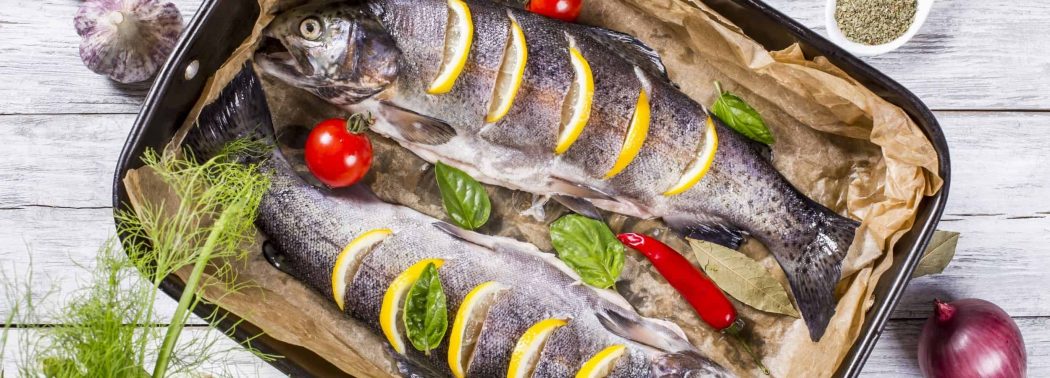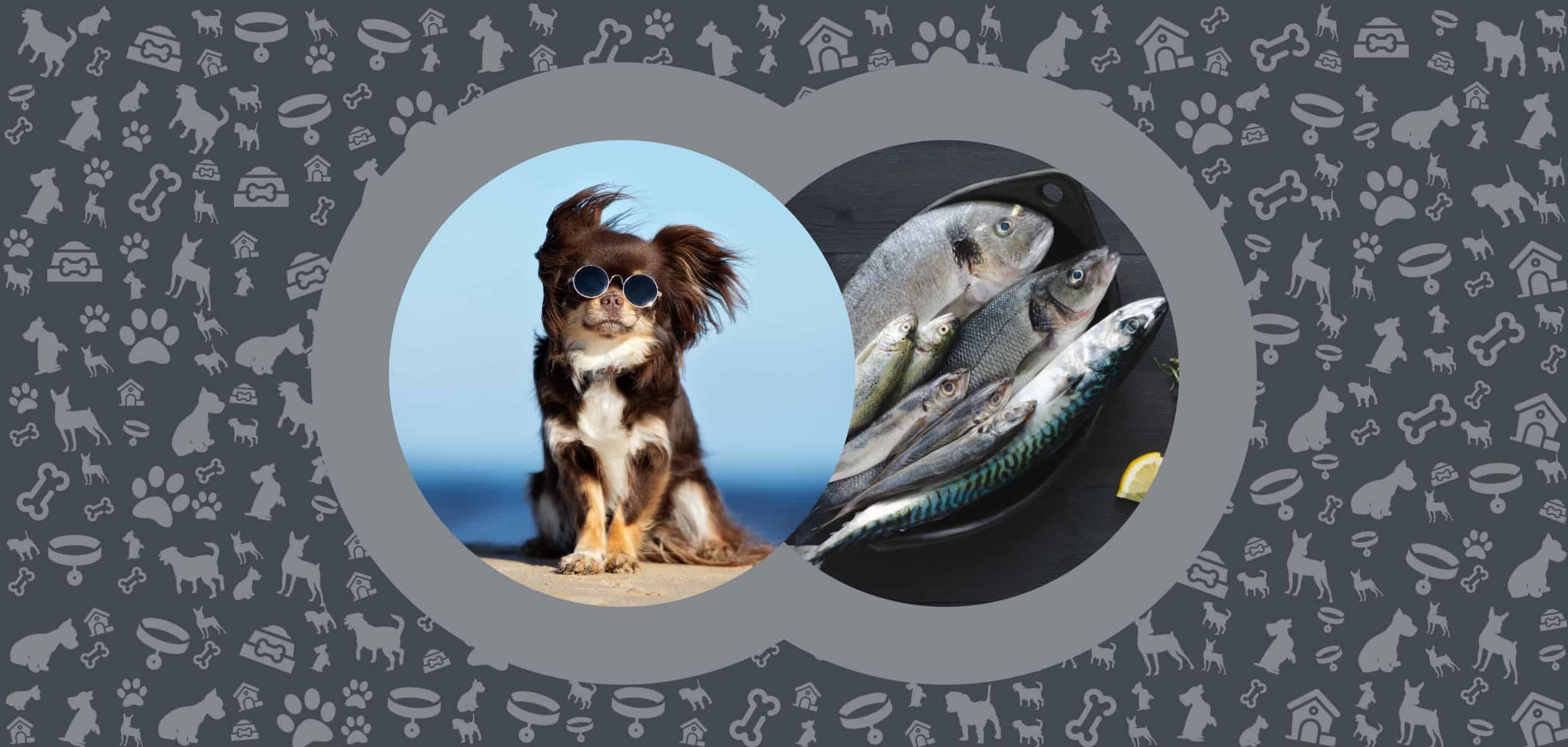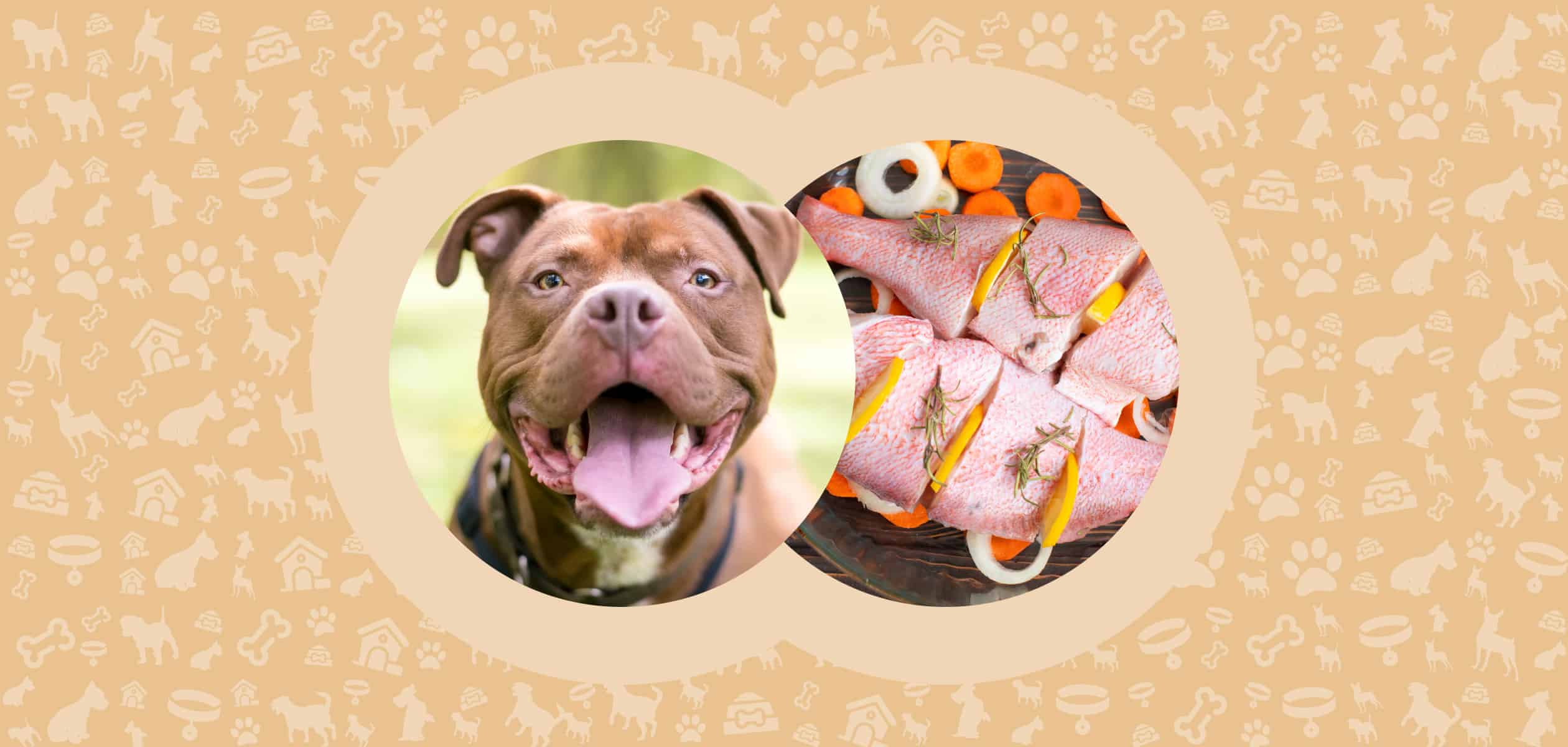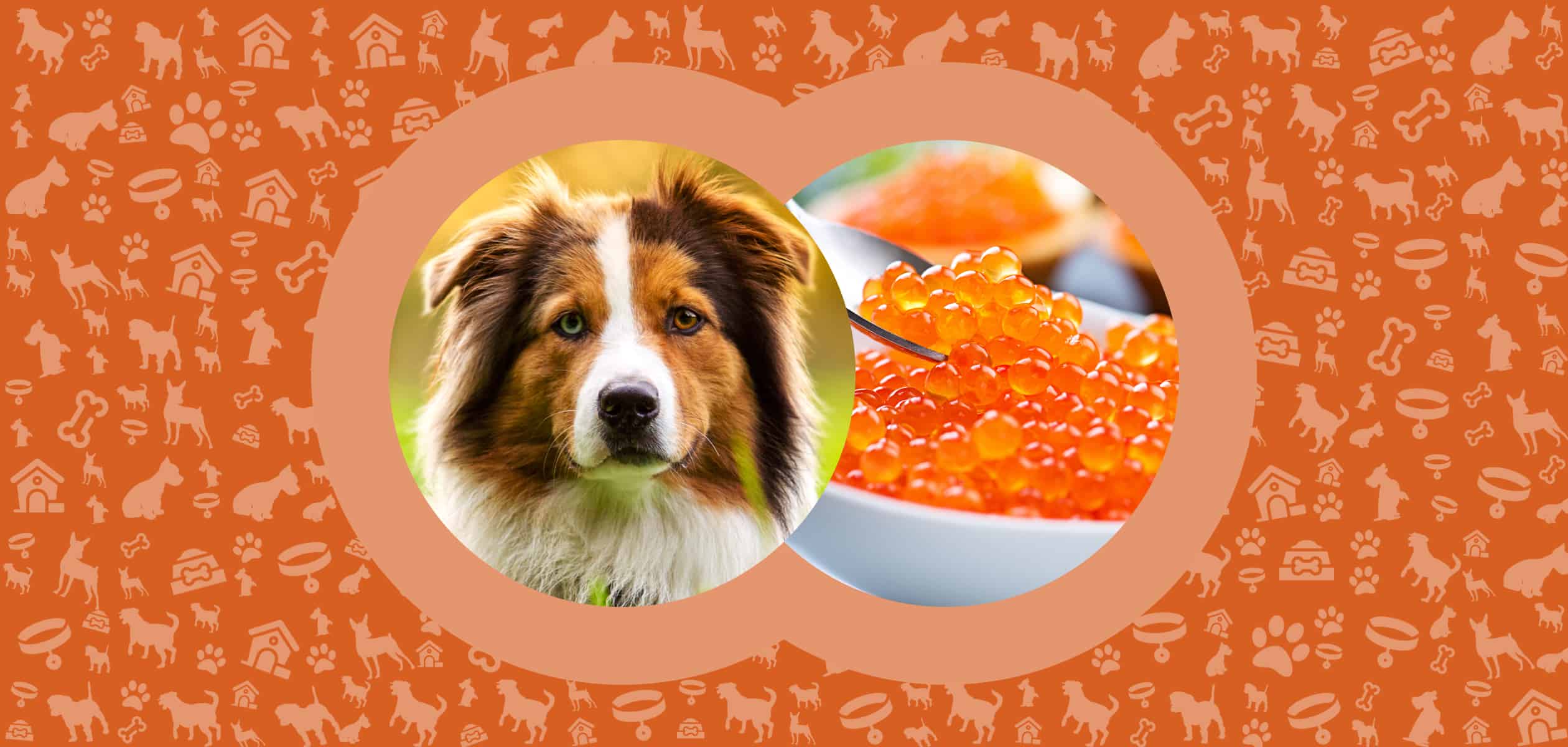Introduction
Fish and seafood are rich in a variety of nutrients, most of which can have a positive impact on both people’s and animals’ health. But can dogs eat fish? Can dogs eat seafood? We’re answering these questions and more in today’s article, so check it out below.
- Introduction
- Is fish good for dogs?
- Should dogs eat fish?
- How much fish can I feed my dog?
- Fish and seafood dogs can eat
- What fish is not good for dogs?
- Frequently Asked Questions
- How to cook fish for dogs
- How to serve
-
Specific recipes
- Can dogs eat fish in tomato sauce?
- Can dogs eat fish in sunflower oil?
- Can dogs eat fish in brine?
- Can dogs eat fish in parsley sauce?
- Can dogs eat fish in batter?
- Can dogs eat fish with lemon juice?
- Can dogs eat fish in olive oil?
- Can dogs eat fish in breadcrumbs?
- Can dogs eat fish and chips?
- Can dogs eat fish and shrimp?
- Can dogs eat fish and rice?
- Best practices and restrictions
- Summary
Is fish good for dogs?
Depending on the species you intend to feed to your dog, fish can be a safe and healthy snack every once in a while. However, it should not make up more than 5 to 10% of your pet’s diet. Here are some of the best nutrients that can be found in fish.

Vitamins
The kind and quantity of vitamins largely depend on the exact type of fish we are discussing. But just to give you a clue as to how vitamin-rich fish can be, we’ll take 100 grams of cooked Atlantic salmon. It contains 6% in vitamin C, 30% in vitamin B6, and 46% in Cobalamin (also known as vitamin B12).
While the latter is essential in anemia and osteoporosis prevention, the role that vitamin C plays in maintaining a healthy immune system has been studied and proven time and again. As for vitamin B6, it can help a dog’s body produce melatonin, a hormone that’s important for regulating sleeping habits.
It’s also massively involved in the production of norepinephrine, which can help your pet better cope with stressful situations.
Magnesium and Calcium
These two are essential for maintaining bone density, which means preventing musculoskeletal pathologies. They are often prescribed to puppies in the form of tablets as they can prevent rickets, along with vitamin D.
Omega-3 Fatty Acids
Omega-3 fatty acids have been linked to a number of benefits from lowering blood pressure, maintaining cardiovascular health, and preventing diseases of the central nervous system such as dementia.
Furthermore, omega 3 from fish and seafood can also prevent the development of thrombosis (plaque inside the arteries), so it decreases the risk of your dog suffering a heart attack or a stroke.
Should dogs eat fish?
If your dog is not a fan of fish and seafood, we suggest avoiding feeding these two foods to him or her. Many pet parents give their dogs supplements, whether recommended by their vets or not, and they could contain the previously mentioned vitamins and even omega-3 fatty acids.
Feeding fish and seafood to a dog doesn’t come without any risks, so here are some of those that you will have to do your best at managing.
Contaminants
Some fish species, particularly tuna, can contain traces of mercury. In fact, the quantity of mercury that can exist in this fish type can be so high that it is not recommended to pregnant women, either.
Besides heavy metals, fish can be contaminated with toxins or a variety of other pollutants.
Just think of the amount of waste that ends up in the world’s waters these days and you’ll reach the conclusion that farmed fish is often healthier compared to wild-caught fish.
Bacteria such as Listeria or Salmonella
You’ve probably heard about Salmonella before in connection with food poisoning. Well, this bacteria can affect a whole range of species, not just humans, so it can cause severe digestive distress in dogs that have consumed fish contaminated with the germ.
Raw fish runs the risk of being contaminated with bacteria such as Salmonella and Listeria more than cooked fish and that’s because the high temperatures involved in preparing fish and seafood often kill pathogenic microorganisms.
As for Listeria, it is a bacteria that’s prevalent even in farmed and wild-caught rainbow trout, so this species also has to be completely cooked through to avoid any health risks.
Parasites
There are several main types of parasites that can exist in fish and seafood:
- Nematodes (roundworms)
- Cestodes
- Trematodes (flukes)
- Flatworms
Regardless of the species, if you feed your dog raw fish and seafood, the likelihood of your pet picking up such a pathogen can be quite high. Parasites are present in both farmed and wild species.
How much fish can I feed my dog?
When consumed in moderation, cooked, steamed, or grilled fish and seafood can make a healthy treat every now and then. Overdoing it is not advised for the risks that we have already showcased above.
It all depends on your dog’s size and food tolerances, after all. If you have a Chihuahua, you should keep the fish and seafood quantity to a minimum, sometimes meaning less than a tablespoon per week. If you have a Saint Bernard, you can give your dog fish twice a week also in amounts such as 1-2 tablespoons each time.
Some dogs can be allergic to fish or even more, certain types of seafood, and if you know that this is your pet’s case, make sure to inform everyone in your home and all of your friends and acquaintances – so that they never give your dog table scraps containing these ingredients.
Fish and seafood dogs can eat
Best fish for dogs
According to the American Kennel Club, some of the best fish species that dogs can eat are the following:
- Herring
- Flounder
- Walleye
- Ocean whitefish
- Salmon
- Lake whitefish
- Arctic char
The species that should be avoided are swordfish and tuna as they are most often linked to mercury contamination.
Scallops
Scallops can be fed to dogs provided that they are completely cooked through. In fact, they’re one of the richest foods in magnesium and potassium, as well as protein.
Do not feed your dog raw scallops as they could carry dinoflagellates, which can lead to paralytic shellfish poisoning. Fried scallops can be less healthy as they are very oily, but they’re still better than their raw counterparts.
Seaweed
If the seaweed you intend to give your pet doesn’t contain any spices, condiments, or seasonings whatsoever, it is completely safe to feed to dogs. It’s worth adding that it is quite rich in iodine, iron, magnesium, and it even has omega-3 fatty acids, which, by the way, can also be found in fish and some types of seafood.
Is shrimp bad for dogs?
The answer might be a bit vague. It depends on your dog’s health status. Since shrimp is quite high in cholesterol, it should not be given to dogs that have obesity or liver health issues.
On the other hand, young and adult dogs that are perfectly healthy can eat (cooked) shrimp as it is quite low in calories and carbs and it doesn’t even contain too much fat (besides cholesterol).
Do consider shrimp a treat and not your dog’s main food, though, and always refer to your vet if you have any doubts.
What fish is not good for dogs?
Shark, tilefish, king mackerel, swordfish, and tuna are the species that you should avoid feeding to your dog. As previously noted, they are linked to mercury contamination especially since they are usually caught when they are larger and older — so they can retain more heavy metals in their flesh.
Besides this risk, they can carry parasites and bacteria as any other fish species.
Can dogs die from eating fish?
There is one situation where dogs could actually die after eating fish. Salmon Poisoning Disease can be lethal, especially if your pet doesn’t get treatment at the right time. Some of the symptoms it causes are the following:
- Diarrhea
- Vomiting
- Absence of appetite
- Lethargy
- Fever and dehydration
- Lymph node inflammation
Although it is quite dangerous, most dogs die within 14 days of starting to show any symptoms, which means that you have plenty of time at your disposal to get to the animal hospital and seek out veterinary assistance.
The typical treatment of Salmon Poisoning Disease often involves an antibiotic and a wormer as the first decimates the rickettsial organisms that cause the symptoms and the second kills the parasite that is at the root of the condition.
Are dogs allergic to fish?
Although fish allergy used to be quite uncommon in dogs, it is now becoming more and more prevalent. The reason for this is that many pet owners choose to give their dogs a ‘hypoallergenic’ diet which could be made from fish instead of beef and chicken.
The more fish a dog eats, the more likely he or she is to develop a food intolerance to it. Since many dogs are not fed seafood, at least not on a regular basis, seafood allergies are very rare.
Can dogs eat sushi?
Dogs can eat sushi provided that the fish or seafood you use in the preparation of the dish is not raw. Also, sushi should have no seasonings, condiments, or spices whatsoever.

Frequently Asked Questions
While it might be true that raw meat and raw fish have a lot more nutrients compared to their boiled counterparts, for example, they can also be dangerous for a dog’s health. For this reason, we advise you to avoid giving your dog raw fish even as a treat as it can carry bacteria and parasites. Freshwater fish that has just been caught might be safer compared to saltwater fish merely because it might contain less amounts of heavy metals.
The matter of whether dogs can eat fish with bones or not is quite a simple one – fish bones can get lodged into any part of your dog’s digestive tract, whether their mouth, pharynx, esophagus, stomach, or inside the intestines. They can create a blockage, but they can also cause your dog to choke if they get stuck in their throat. As you can imagine, this makes for a rather painful and traumatizing experience, so do try to avoid giving your dog fish bones.
While the fish scales of some species are practically harmless, the ones of other fish types are not. They can be sharp and could at least irritate the inside of your dog’s gastrointestinal tract, which can make him/her develop indigestion. However, if you use your pressure cooker for cooking fish skins, you might be able to soften them up a lot. Fish skin can provide your pet with the same vitamins and minerals as the fish flesh itself.
No. Most types of fried food, including fried fish, can cause digestive distress, but that’s not the only complication that could arise from this practice. In fact, some dogs, especially older ones who already have enough chronic illnesses, could develop pancreatitis as a result of eating oily foods. If the fish is dipped in batter and fried in garlic oil, it can be a disastrous combination.
Yes. Dogs can eat fish sticks, but the best way of preparing them would be to bake them instead of frying them. The truth is that fish sticks rarely have any nutritional value, so besides being a tasty snack, they aren’t going to help in any way.
Smoked fish is not considered safe for dogs as it doesn’t go through the same thermal preparation processes involved in boiling, baking, or steaming. For this reason, even if the fish is smoked according to health standards, it can still carry parasite eggs in its flesh.
How to cook fish for dogs
Fish and seafood have to be cleaned properly and then boiled, steamed, or cooked in the oven until you know for sure that all the germs or parasite eggs have been killed by the high temperature. Do not use any ingredients you would normally add to a dish you’d prepare for yourself or your family – whether they be garlic, onion, salt, pepper, cayenne, or anything of the sort.
These are all dangerous for dogs. You can add canned (in water, not oil) fish or seafood to your homemade dog diet if that’s what you regularly feed your pet, but do consider the risk of bacterial contamination and make sure you’re as hygienic as possible when preparing it.
Can dogs eat cooked fish bones?
No. Fish bones are always dangerous and since you can’t know for sure just which one is going to cause a problem, we strongly advise you to avoid giving them to your dog no matter the amount of hours you might have boiled them for.
Can dogs eat cooked fish heads?
Although the bones in fish heads are larger so therefore, they pose less of a health threat to dogs, we still recommend that you avoid giving them to your pet.
Some of them can be broken down by your dog’s teeth into quite small pieces, and these can be sharp and cause a gastric perforation. Naturally, this doesn’t mean that it will happen to all dogs or even your own, but why risk anyway?
If you end up at the emergency vet clinic because of this, you could go into debt if you don’t have insurance as the surgery for extracting the fish bone fragments and suturing the lesions inside your dog’s digestive tract can set you back at least several thousands of dollars (if not more).
How to serve
You can serve the boiled, steamed, or baked fish and seafood in its original form, which would be the best way as it would ensure the least amount of risk involved. You can also mix it with other ingredients such as rice and form tiny sticks or balls that you can give your dog as a treat on occasion.
For dogs that have problems with constipation, for example, you can even mix the cooked fish and seafood with pumpkin for a healthy amount of fiber.
Specific recipes
Can dogs eat fish in tomato sauce?
Most cans contain about 30-35% tomato sauce and 65-70% fish or seafood. Although tomato isn’t the best food to feed to dogs, if it is cooked, it’s less risky. As such, the answer to the question is a yes.
Can dogs eat fish in sunflower oil?
If what you’re referring to are cans of fish ‘bathed’ in sunflower oil as a preservation method, they are best avoided. The fat content can be dangerous, especially for dogs with a history of pancreatic and hepatic disease.
Can dogs eat fish in brine?
No. Brine usually contains alarming amounts of salt which can be life-threatening to dogs. In fact, it’s not uncommon for some dogs to develop sodium poisoning after having very salty food.
Can dogs eat fish in parsley sauce?
Yes. Parsley is mostly harmless, and if you’re lucky enough to have your own garden, in which case you could grow your own organic and pesticide-free parsley, you’re definitely allowed to give your pet some fish and seafood cooked in parsley sauce.
In fact, parsley can provide itch relief as well as help maintain your dog’s urinary tract health.
Can dogs eat fish in batter?
No. The batter merely absorbs most of the cooking oil, so not only does it add unnecessary calories to the entire dish, but it also poses health risks to your dog’s pancreas. If you remove the batter and the fish were to be completely unseasoned, then you could feed it to your pet.

Can dogs eat fish with lemon juice?
No. Lemons are quite acidic and although they might have excellent amounts of vitamin C, they are going to irritate the inside of your dog’s gastrointestinal tract. Besides, the peel can be contaminated with pesticides, so they are best avoided entirely.
Can dogs eat fish in olive oil?
Canned fish varieties that are preserved in olive oil are better than those that are the same in sunflower oil. However, you should try to do your best at removing any excess oil from the surface of the fish or seafood as possible.
Do consider that some fish species such as sardines already contain enough fat as it is so they’re going to improve your dog’s coat and skin by themselves, without you having to give your pet any additional oil.
Can dogs eat fish in breadcrumbs?
It depends on the type of fish recipe you use. For example, if you intend on baking the fish, add some breadcrumbs to it, and use no seasonings whatsoever, then it is safe to feed to your dog.
But if you intend on deep frying the fish that has been dipped in breadcrumbs and it also contains seasonings, then the answer to the question is a no.
Can dogs eat fish and chips?
No. Fried fish and fried potatoes are not recommended to dogs in any situation, whether desperate or not. Unseasoned boiled fish and boiled potatoes are much healthier by comparison.
Can dogs eat fish and shrimp?
Fish and prawns can be given to dogs after they have been cooked properly. However, do keep in mind that prawns, lobsters, and crab have to have their shells completely removed before safely feeding them to pets.
Can dogs eat fish and rice?
Small amounts of both of these foods can be safe so long as you do not overdo it. Steamed fish and unseasoned rice pilaf can make a nice treat every now and then and you can even mix them together and create freezable snacks for your pet.
Best practices and restrictions
Given the risks involved in feeding both fish and seafood to your dog, we suggest that you never give these foods to pregnant bitches, puppies, and geriatric pets. The immune system of puppies and seniors is not capable of the same performance as that of a completely healthy adult dog.
Pregnant dogs are not to be given undercooked or raw fish or seafood in any circumstance and since you do not want to put your pet’s health in danger, we advise that you avoid these foods altogether during the gestation period.
Mercury from tuna can be transmitted to the puppies through the placenta and can cause them to be born with diseases of the nervous system.
The parasites in the fish and seafood flesh, skin, or internal organs can pose health risks, too. If you ever feel unsure about giving your dog one type of fish or seafood, do not hesitate to call your vet. Your veterinarian knows your pet’s health status best and they can advise you accordingly.
Summary
Cooked fish and seafood can be safe for dogs with the exception of some species, such as mackerel, swordfish, and tuna, which are known to be contaminated with mercury. Make sure you always give your pet unseasoned fish and seafood to prevent mishaps such as food poisoning because of garlic or other ingredients.
Sources
- Salmonella Infection, 2015, Centers for Disease Control and Prevention
- Prevalence and Antimicrobial Resistance Profile of Listeria Species Isolated from Farmed and On-Sale Rainbow Trout, 2018, Ramin Rezai, Elham Ahmadi, Behnam Salimi
- Best Types of Fish for Dogs, 2021, Anna Burke
- BSAVA: Paralytic Shellfish Poisoning – Information for vets and pet owners, 2018, on behalf of the Eastern Inshores Fisheries and Conservation Authority (IFCA)
- Overview of Salt Toxicity, 2015, Larry J. Thompson
- Raw and undercooked animal-source protein in cat and dog diets, American Veterinary Medical Association
- Salmon Poisoning Disease, 2021, Washington State University







Leave a Comment